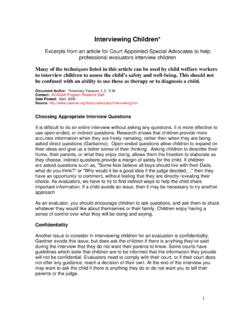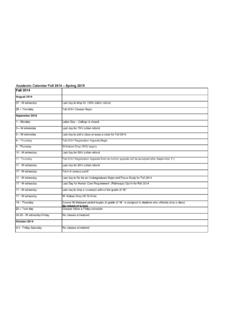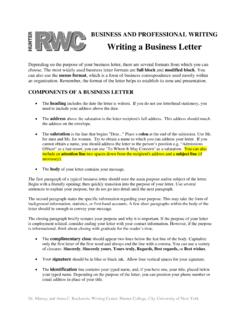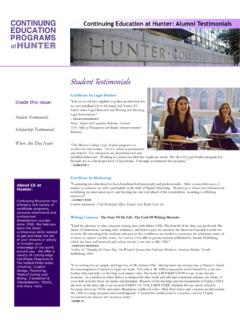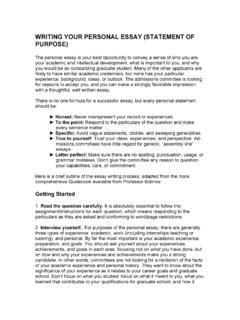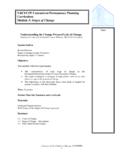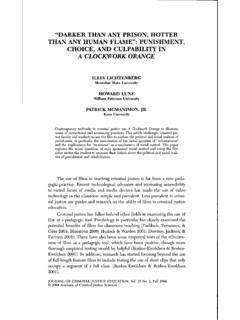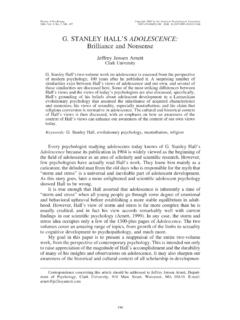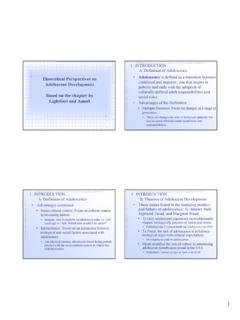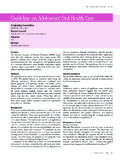Transcription of Late Adolescence (18-21 years old) - Hunter College
1 Revised 5/1/09 National Resource Center for Family-Centered Practice and Permanency Planning Hunter College School of Social Work 129 E. 79th Street New York, NY 10021 Tel. 212/452-7053 Fax. 212/452-7051 e-mail 1 late Adolescence (18-21 years old) Developmental Milestones Physical Physical maturity and reproductive growth leveling off and ending Firmer sense of sexual identity Emotional/Social Separation from caregivers More comfortable seeking adult advice Peers are important but young person can now evaluate their influence and opinions rather than wholeheartedly embracing them without question Intimate relationships are important Acceptance of adult responsibilities Intellectual/Cognition Abstract thought established future oriented; able to understand, plan and pursue long range goals Philosophical and idealistic Increased concern for the future (What do I what to do with my life?)
2 Greater capacity to use insight Suggested Well-Being and Permanency Questions for Birth Parents What was/is it like for you to care for your young person at home? What has been the effect on your family of having this youth placed? What did you expect it to be like? Help me understand what it has been like for you dealing with your youths placement in foster care? What were some of the adjustments you have experienced in parenting your youth as they have become an adolescent? What do you need to do so that you ll feel good about yourself and in control of your life again? Scaling Question: Thinking about the problems that led to your youth s placement, on a scale of 1-10, with 10 meaning you have every Revised 5/1/09 National Resource Center for Family-Centered Practice and Permanency Planning Hunter College School of Social Work 129 E.
3 79th Street New York, NY 10021 Tel. 212/452-7053 Fax. 212/452-7051 e-mail 2confidence that these problems can be solved and 1 means you have no confidence at all, where would you put yourself today? Can you give me examples of why? What would it take to make that score one point higher? What would be different in your life if you were to make a change? On a scale of 1-10, with 10 being the most willing and 1 being not willing at all, how willing would you say you are to work to solve these problems? Miracle Question: Suppose that one night, while you were asleep, there was a miracle and all the problems that led to the placement of your youth were solved. How would you know they were solved? What would be different? Could you tell me something you like about parenting your youth? What things are not so good about parenting him/her?
4 What might happen if you don t change? How would changing your behavior affect your youth and family? What is the permanency goal for your youth? What do you think/feel about this? What makes it okay; not okay? How have you been included in the family conferences/treatment team meetings? What are your responsibilities (things you do such as visits, treatment, getting your house ready for your youth to return, etc.) in the case plan? Were you involved in helping to choose the alternative permanent plan (adoption or guardianship) and which family would care for your youth? In order to have your youth returned to you, what will be the first sign that things are moving in the right direction? What services do you need in order to care for your youth? What do you think/feel about those services? How have your visits been with your youth?
5 What types of things do you do together during the visits? What could be done by you or others to improve visits? Who else does your youth visit (friends, siblings, extended family)? How is your youth helped to remain connected to school, religion, culture, neighborhood, What services do you think your youth will need in order to return home? To whom do you go when things are going well? To whom do you go if things aren t going too well? Revised 5/1/09 National Resource Center for Family-Centered Practice and Permanency Planning Hunter College School of Social Work 129 E. 79th Street New York, NY 10021 Tel. 212/452-7053 Fax. 212/452-7051 e-mail 3 What is your greatest fear about your youth returning home? What is your greatest fear if your youth does not return home? What things do you need to support your continued care of this young person?
6 How will you help your youth plan for their post-secondary education or vocational school? Describe who your youth is. What about your youth is easiest and most pleasurable? What was the most difficult aspect of dealing with your youth at home? What are the things about this youth that will help him/her in the future? What will be harder for him/her? Reviewing Safety Concerns with Birth Parents 9 Who provided supervision for your youth when you were not home? How do you know this person? How old is this person? Is there a way for your youth to reach you when you are away from home? 9 How did your youth get to and from school? 9 Did you know where your youth was when s/he was not at school and was away from home? What are your rules for your youth when s/he is not at school or home? Is there a way for your youth to reach you when s/he is away from home?
7 9 What are the names of your youth s friends? Do you know how to reach them and their parents? 9 Does your youth know your address and phone number? 9 Can you show me the family s list of phone numbers for your doctor, local hospital, police, fire department, poison control center and a friend or neighbor near the phone? 9 What is the emergency plan for your family in case of fire? Does your youth know where smoke alarms and carbon monoxide alarms are located in your home? 9 If the worse case situation were to occur and your youth was in danger of being abused again, does your youth know what to do? Is there someone besides you available 24/7 the youth can call for help? Revised 5/1/09 National Resource Center for Family-Centered Practice and Permanency Planning Hunter College School of Social Work 129 E. 79th Street New York, NY 10021 Tel.
8 212/452-7053 Fax. 212/452-7051 e-mail 49 Did this youth have any serious injuries, either before or since coming into your care? How did you handle them? How is this condition being handled since foster care placement? How will you handle this condition when your youth returns home? 9 Have you noticed any physical or emotional changes in your youth? As your youth is becoming a teenager are there changes in his/her behaviors? How has that changed your relationship with your youth? Has it changed how you discipline your youth or the rules you have for your youth? 9 Does your youth have any chronic health conditions? Do you have the necessary medications, medical equipment, and medical staff support to adequately deal with this condition? How will handle this condition when your youth returns home? 9 Do you have a First Aid Kit in your home?
9 Does your youth know where it is and how to use it? 9 When your youth was living at home, did you feel they were able to exhibit good judgment when approached by strangers? Could you give me an example? 9 Have you explained the concept of date rape to your youth? How have you empowered them to resist being pressured or forced into unwanted sexual activity? Could you give me an example of things you have said in your conversations with him/her? 9 How have you talked to your youth about the health risks of alcohol, tobacco and drug abuse? If they have a problem with these issues, how will you deal with them when they return home? What is the safety plan if your youth is abusing substances upon return home? Who can you call to help you? Well-Being Questions for late Adolescents Living with Their Family Living Arrangements: What is it like living with your family again?
10 On a scale of 1-10, with 10 being everything is great, what is it like at your home now? What could make that better? What is the best thing about being at home? What is the worst? My biggest fear Revised 5/1/09 National Resource Center for Family-Centered Practice and Permanency Planning Hunter College School of Social Work 129 E. 79th Street New York, NY 10021 Tel. 212/452-7053 Fax. 212/452-7051 e-mail 5 Who else lives here with you? What do you think about the other people who live here? What is it like living with them? What are some of the rules your family has? What happens if you break a rule? How often does this happen? Daily Routine: Tell me what a typical day is like from when you get up to when you go to bed? (Get the youth to tell their story rather than asking questions.) Goal Setting and Planning What are your goals for the future?
